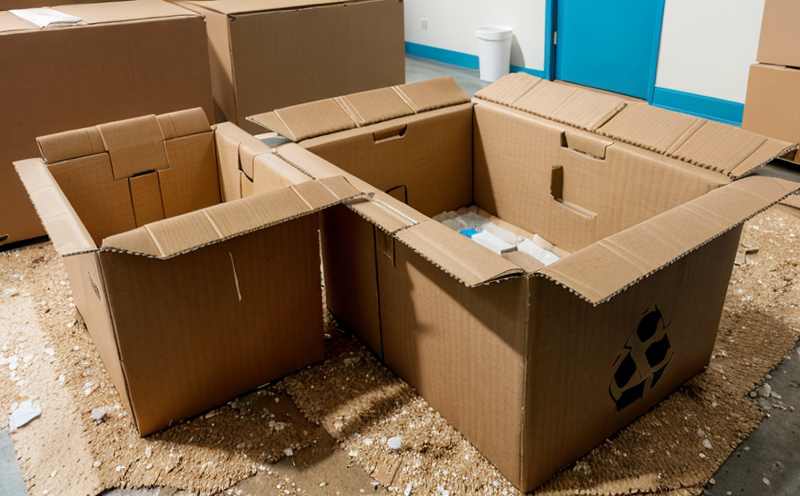TAPPI T220 Physical Testing of Recycled Paper Sheets
The TAPPI T220 standard is widely recognized as a key methodology in the physical testing of recycled paper sheets. This test is crucial for quality assurance and compliance, ensuring that recycled paper meets specific performance criteria set by industry standards.
Recycled paper is an important component in sustainable production processes, but it can vary significantly in its properties based on the source material and recycling process. The TAPPI T220 method helps to standardize these variations, providing a consistent means of measuring critical physical attributes such as tensile strength, tear resistance, and burst strength.
The test is particularly relevant for manufacturers who rely heavily on recycled materials. By using this method, they can ensure that the paper used in their products meets the necessary performance standards, thereby enhancing product quality and reliability.
For those involved in waste management and recycling testing, TAPPI T220 offers a robust framework to evaluate the physical properties of recycled paper sheets. This standard is not just about compliance; it's also about ensuring that recycled materials perform as expected in real-world applications.
The test involves several stages, each designed to assess different aspects of the paper’s physical characteristics. It begins with sample preparation, where samples are cut into uniform pieces suitable for testing. The T220 method then proceeds to measure tensile strength, which is crucial for understanding how well the paper can withstand stretching forces without tearing.
Other key parameters include tear resistance and burst strength. These tests help to determine the durability of the recycled paper under stress and pressure. Understanding these properties is essential for manufacturers who use recycled paper in products that must endure various uses and environmental conditions.
The TAPPI T220 standard also provides guidance on the equipment needed for testing, including tensile testers and burst testers. These instruments are critical to obtaining accurate results, as they ensure consistent application of forces during testing. The use of standardized equipment is essential for maintaining the reliability and consistency of test results.
Compliance with TAPPI T220 is not just about meeting regulatory requirements; it's also about ensuring that recycled paper meets the expectations of manufacturers who rely on it as a key component in their products. This standard helps to bridge the gap between waste materials and valuable resources, facilitating sustainable production processes.
The application of TAPPI T220 is particularly significant for industries where recycled paper plays a vital role. By using this method, companies can ensure that the recycled paper they use is of high quality, thereby enhancing product performance and customer satisfaction.
Understanding the nuances of the TAPPI T220 standard is crucial for those involved in waste management and recycling testing. It provides a clear framework for evaluating the physical properties of recycled paper sheets, ensuring consistency and reliability across different batches and sources.
The test's relevance extends beyond compliance to real-world applications where recycled paper is used in products that must withstand various environmental conditions. By using TAPPI T220, manufacturers can ensure that their products are built on a foundation of reliable materials, enhancing overall product quality.
Scope and Methodology
| Test Parameters | Description | Equipment Required | Procedure |
|---|---|---|---|
| Tensile Strength | Measures the force required to rupture a sample of paper. | Tensile tester | Prepare samples, apply tension until failure, record force at point of breakage. |
| Burst Strength | Evaluates the maximum pressure that can be applied before the paper bursts. | Burst tester | Place sample between plates and increase pressure until rupture occurs. |
| Tear Resistance | Determines the force needed to tear a sample of paper. | Tear tester | Measure the force required to initiate and propagate a tear through the paper. |
The TAPPI T220 standard provides comprehensive guidance on how to conduct these tests, ensuring that results are accurate and consistent. The scope of this method covers various recycled paper sheets used in different industries, making it an essential tool for quality assurance.
For manufacturers looking to enhance their product performance, the TAPPI T220 method offers a robust framework. By using standardized equipment and following the prescribed procedure, companies can ensure that they are meeting industry standards and delivering high-quality products.
International Acceptance and Recognition
- The TAPPI T220 standard is widely accepted in North America and Europe for its reliability and consistency.
- It aligns with ISO 15219, which provides additional international recognition and acceptance.
- Compliance with this standard ensures that recycled paper meets the necessary performance criteria set by global standards organizations.
- The method is recognized by environmental and sustainability initiatives worldwide, further enhancing its credibility and acceptance.
The widespread adoption of TAPPI T220 in various regions highlights its significance as a benchmark for recycled paper quality. This standard plays a crucial role in ensuring that manufacturers can confidently use recycled materials while meeting stringent performance criteria.
Competitive Advantage and Market Impact
Adopting the TAPPI T220 method provides significant competitive advantages to companies involved in waste management and recycling testing. By ensuring that recycled paper meets high standards, manufacturers can enhance product quality and reliability, leading to increased customer satisfaction.
The use of this standard also helps companies differentiate their products in a crowded market. Customers increasingly favor sustainable and eco-friendly options, and compliance with TAPPI T220 can be a key differentiator. This not only enhances brand reputation but also opens up new market opportunities.
In terms of cost-effectiveness, the TAPPI T220 method ensures that recycled paper is used efficiently and effectively. By ensuring that materials meet specific performance criteria, companies can avoid costly rejections or quality issues later in the production process.
The standard also promotes innovation within the industry by providing a clear framework for research and development. Engineers and R&D teams can use TAPPI T220 as a benchmark to develop new products and processes that meet the highest standards of performance and reliability.





